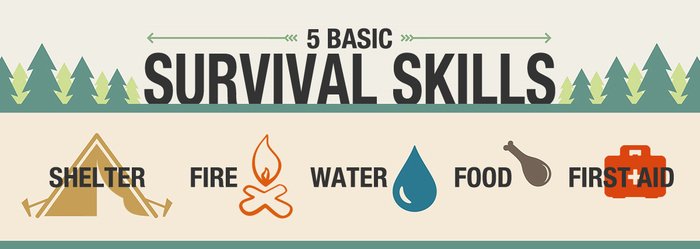Survival Skills Every Outdoorsman Should Master


Preparing for any excursion takes more than a bottle of water and a well-packed travel bag. In fact, critical survival skills - while hopefully never needed - can get you through a crisis situation should the need arise. Honing your survival skills takes time and preparation, but these skills are just as important as anything you could stow away in your backpack. Here are a few survival skills that every outdoorsman or woman should master.
Survival skills are based around the basic essentials for life that many of us take for granted when not in a crisis situation. Understanding the priorities helps to organize your method of attack for survival. In the order below, addressing these issues with your survival knowledge can help promote a safer environment supportive of your well-being.
SHELTER: Your immediate security is the first priority, as a well-fed body will be no good if it’s left to the elements. The goal is to stay high and dry, away from running water that could flow through your campsite. With hypothermia being the number one outdoor killer, your skill in creating a suitable shelter is certainly part of survival. Insulate yourself from not only rain but also the ground as well.
FIRE: When man discovered fire, there were a host of new possibilities for survival. From warmth to cooked food, fire provides many survival essentials. With a fire, you can keep yourself warm, purify water, see in the dark, cook food, signal for help, make tools, sterilize surgical equipment and protect yourself from critters. Having a fire is also a huge psychological advantage. Part of this survival skill is having the foresight to packing a stormproof lighter, but flint or a shorted battery can also get the job done in a pinch.
WATER: Once you’ve got your fire started, the good news is that making pure water is fairly easy. “You’ll come across two kinds of water in the wild,” Stewart says. “Potable water that’s already purified, and water that can kill you.” When it comes to questionable water—essentially anything that’s been on the ground long-term, like puddles and streams—your best option is boiling water, which is 100 percent effective in killing pathogens. Rain, snow, and dew are reliable sources of clean water you can collect with surprising ease, and they don’t need to be purified. If you’ve planned and packed effectively, then you should already have a water filter with you as well, and that can make the experience much easier.
FOOD: Once you’ve established your shelter and clean source of water, starting your search for food will be your next task. Hopefully you’ve packed some emergency survival rations to make the transition easier. Fish are one of the best sources of food, but you can also design a rudimentary snare for small land mammals as well.
FIRST AID: If you’ve brought a first aid kit, then your first aid issues - at least initially - should be fairly easy to cope with. For the most part, you need to know the basics of keeping a wound closed and clean, setting and immobilizing broken bones and identifying/treating for shock, hypothermia and heat exhaustion but you need to learn more if at all possible.
While all of these survival tips are essential in a crisis, the most important part is finding your way out of danger in the long run. Learn to navigate, bring a map, and start a signal when you get the chance.









